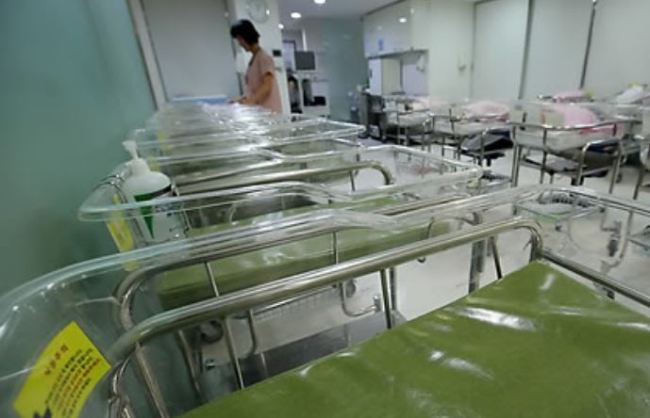South Korea's fertility rate fell to an all-time low in 2017 despite efforts to prop up the chronically low number of children being born in the country amid a rapidly aging population, government data showed Wednesday.
The total fertility rate, or the average number of babies that a woman is projected to have during her lifetime, reached 1.05 last year, down from 1.17 tallied a year earlier, according to the data compiled by Statistics Korea.
The 2017 figure marks the lowest number tallied in Asia's fourth-largest economy to date.
The total fertility rate, or the average number of babies that a woman is projected to have during her lifetime, reached 1.05 last year, down from 1.17 tallied a year earlier, according to the data compiled by Statistics Korea.
The 2017 figure marks the lowest number tallied in Asia's fourth-largest economy to date.

The number of newborns also declined 11.9 percent, or 48,500, to a record low of 357,771 last year.
The average age that a woman had her first child was 32.6 last year, up from 32.4 years in 2016. Some 29.4 percent of first-time moms were over 35 years of age in 2017, up from 26.4 percent the year earlier.
The trend of declining births is not new in South Korea, where an increasing number of women work and want to hold onto their careers. This has led to many getting married later than in the past and having children at an older age.
To tackle the worrisome low-rate trend, the South Korean government has been encouraging people to have more children by offering various incentives, including cash rewards. The low birthrate and aging population can seriously hurt the national economy by reducing the workforce and driving up welfare costs.
Based on the 2016 data, South Korea's fertility rate was the lowest among members of the Organization for Economic Cooperation and Development followed by Spain and Italy, both with 1.34.
The average birthrate of OECD countries stood at 1.68 as of 2015. (Yonhap)


![[Exclusive] Korean military set to ban iPhones over 'security' concerns](http://res.heraldm.com/phpwas/restmb_idxmake.php?idx=644&simg=/content/image/2024/04/23/20240423050599_0.jpg&u=20240423183955)




![[Herald Interview] 'Amid aging population, Korea to invite more young professionals from overseas'](http://res.heraldm.com/phpwas/restmb_idxmake.php?idx=644&simg=/content/image/2024/04/24/20240424050844_0.jpg&u=20240424200058)
![[Pressure points] Leggings in public: Fashion statement or social faux pas?](http://res.heraldm.com/phpwas/restmb_idxmake.php?idx=644&simg=/content/image/2024/04/23/20240423050669_0.jpg&u=)










